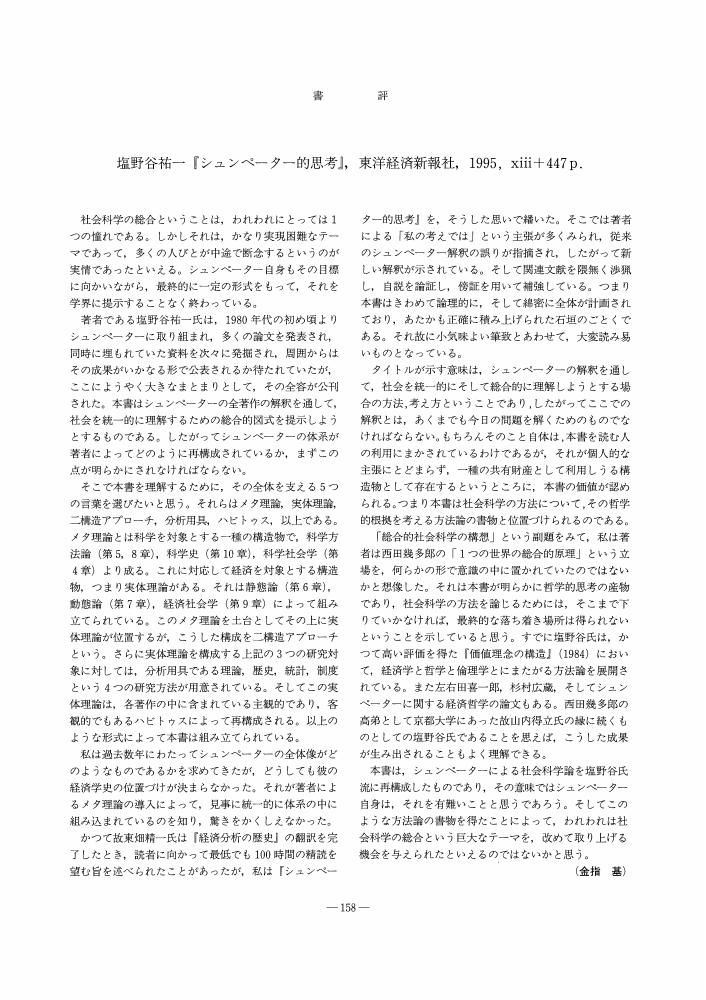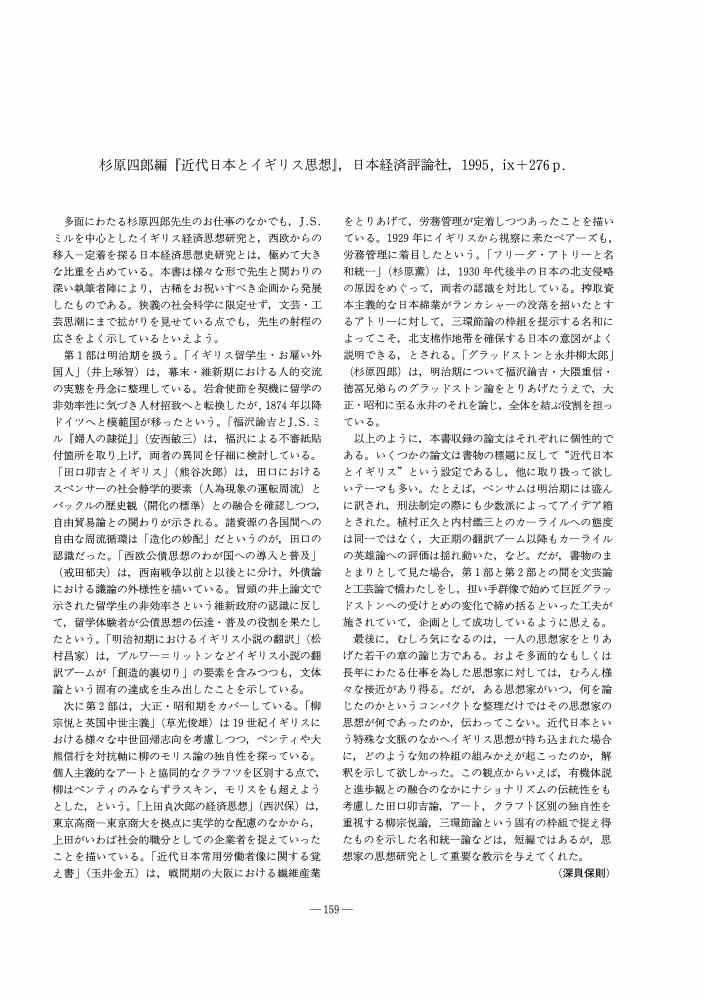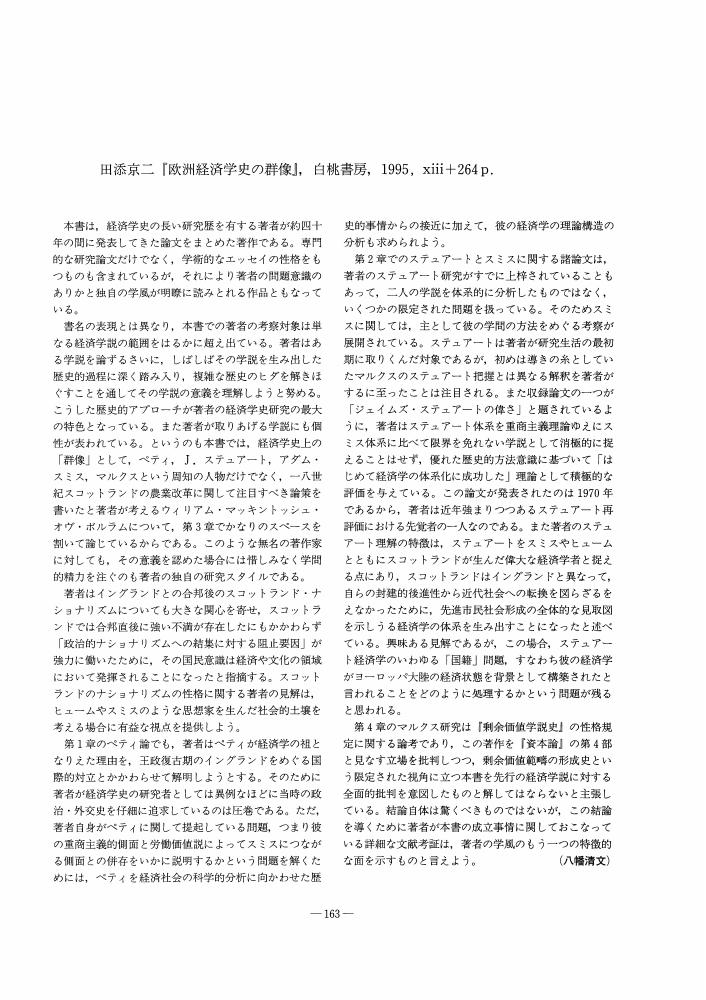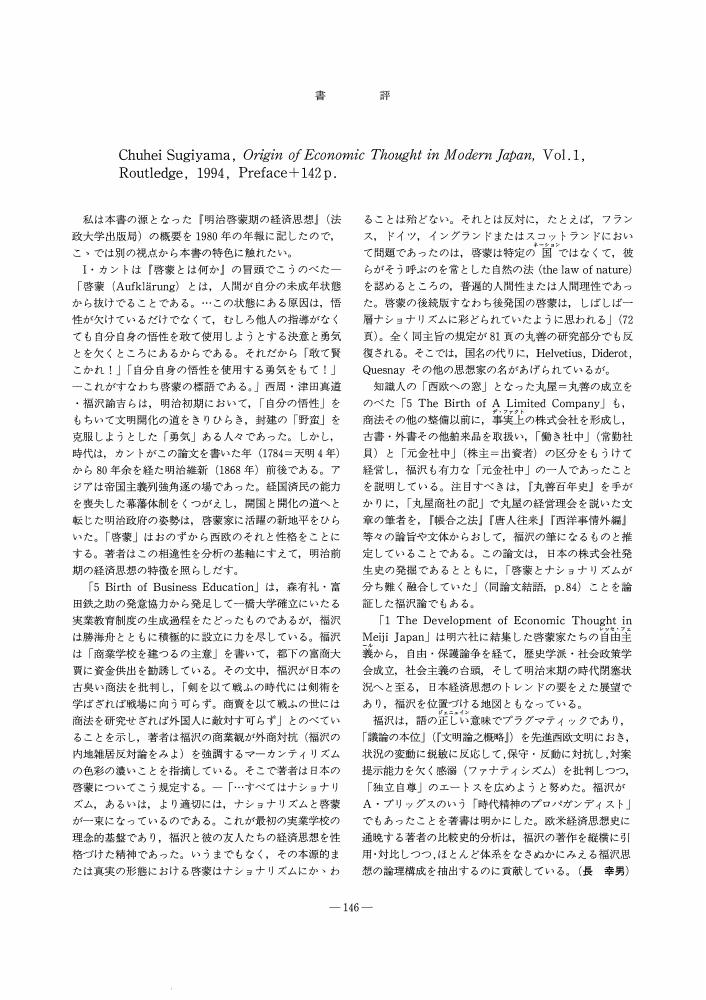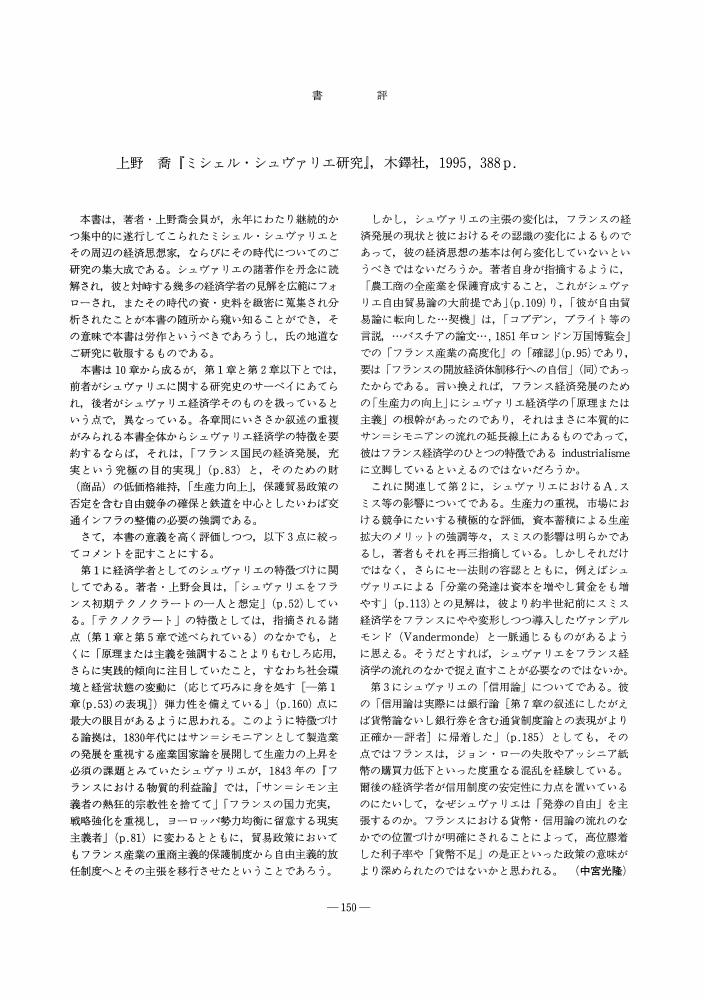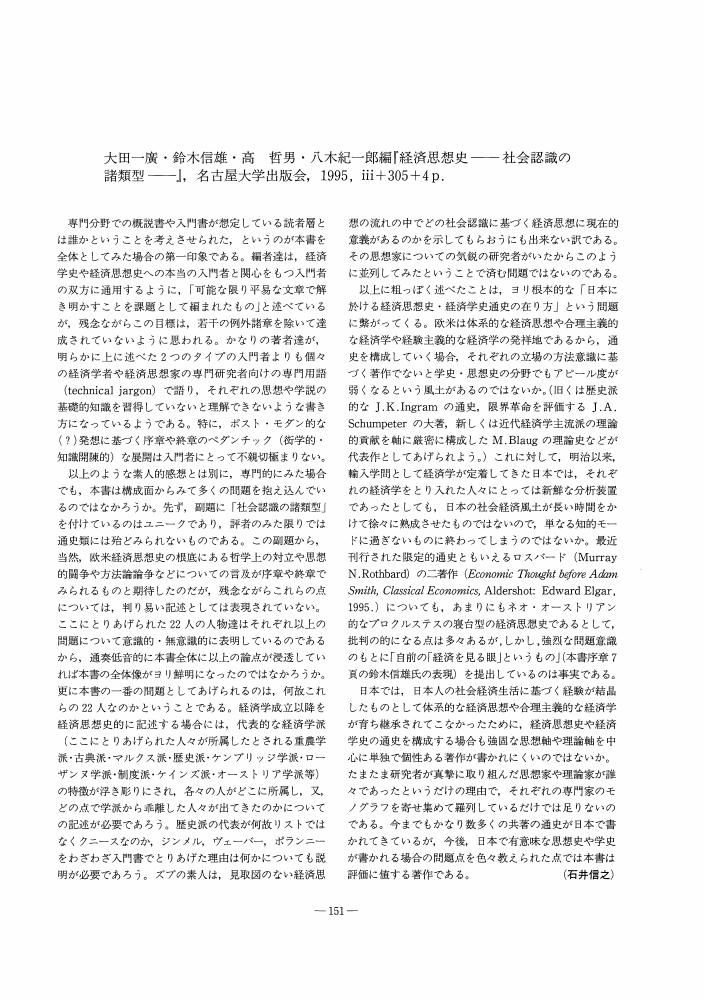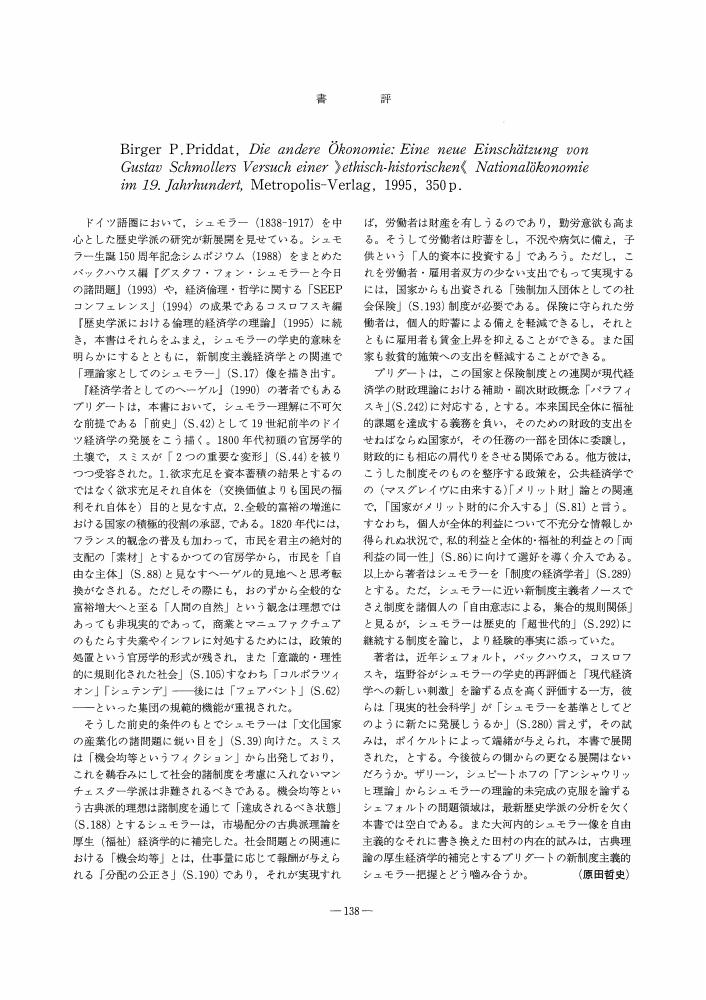1 0 0 0 OA 第二次大戦前後フランスの経済政策と経済思想の革新
- 著者
- 廣田 功
- 出版者
- The Japanese Society for the History of Economic Thought
- 雑誌
- 経済学史学会年報 (ISSN:04534786)
- 巻号頁・発行日
- vol.35, no.35, pp.15-27, 1997 (Released:2010-08-05)
- 参考文献数
- 49
This considers the evolution of economic ideas in France before and after the Second World War, relating it to the reception of Keynesianism. In France, criticism of the “Laissez-Faire” and of Liberalism was primarily made not by university economists but by planist and économiste-ingénieur who professed the ideas of Economie Dirigée (Managed Economy). In this period, small groups espousing Keynesian principles emerged among them. As a result, the theoretical debate was less important and the main aspect of the reception was rather practical.They were concerned with the American New Deal, and under its influence, supported the financial and fiscal policy, devaluation and public works by a deficit spending, to stimulate the recovery until “Blum Experiment”. With the fall of the Blum cabinet, they were more concerned by the relative retardation in technologie and productive equipment which caused low supply capacity of French industry.The defeat against Germany in 1940 accelerated the consciousness of economic retardation. Many leaders, conscious of a crisis of National Power, accepted Keynesianism as means for achieving a Managed Economy. During the War, leaders of the Resistance and Vichy officials introduced Keynesianism as means to the Planning. The Monnet Plan formulated after the War was strengthened in this way, while in France Keynesianism inspired supply-side actions and basis for economic modernization.
1 0 0 0 OA 塩野谷祐一『シュンペーター的思考』, 東洋経済新報社, 1995, xiii+447p.
- 著者
- 金指 基
- 出版者
- 経済学史学会
- 雑誌
- 経済学史学会年報 (ISSN:04534786)
- 巻号頁・発行日
- vol.34, no.34, pp.158, 1996 (Released:2010-08-05)
1 0 0 0 OA 杉原四郎編『近代日本とイギリス思想』, 日本経済評論社, 1995, ix+276p.
- 著者
- 深貝 保則
- 出版者
- 経済学史学会
- 雑誌
- 経済学史学会年報 (ISSN:04534786)
- 巻号頁・発行日
- vol.34, no.34, pp.159, 1996 (Released:2010-08-05)
- 著者
- 内田 弘
- 出版者
- 経済学史学会
- 雑誌
- 経済学史学会年報 (ISSN:04534786)
- 巻号頁・発行日
- vol.34, no.34, pp.160, 1996 (Released:2010-08-05)
1 0 0 0 OA 高島善哉『価値論の復位』, こぶし書房, 1995, 252p.
- 著者
- 宮崎 犀一
- 出版者
- 経済学史学会
- 雑誌
- 経済学史学会年報 (ISSN:04534786)
- 巻号頁・発行日
- vol.34, no.34, pp.161, 1996 (Released:2010-08-05)
1 0 0 0 OA 田添京二『欧洲経済学史の群像』, 白桃書房, 1995, xiii+264p.
- 著者
- 八幡 清文
- 出版者
- 経済学史学会
- 雑誌
- 経済学史学会年報 (ISSN:04534786)
- 巻号頁・発行日
- vol.34, no.34, pp.163, 1996 (Released:2010-08-05)
1 0 0 0 OA 只腰親和『「天文学史」とアダム・スミスの道徳哲学』, 多賀出版, 1995, 261p.
- 著者
- 長尾 伸一
- 出版者
- 経済学史学会
- 雑誌
- 経済学史学会年報 (ISSN:04534786)
- 巻号頁・発行日
- vol.34, no.34, pp.164, 1996 (Released:2010-08-05)
1 0 0 0 OA 羽鳥卓也『リカードウの理論圏』, 世界書院, 1995, xii+197p.
- 著者
- 千賀 重義
- 出版者
- 経済学史学会
- 雑誌
- 経済学史学会年報 (ISSN:04534786)
- 巻号頁・発行日
- vol.34, no.34, pp.165, 1996 (Released:2010-08-05)
1 0 0 0 OA Chuhei Sugiyama, Origin of Economic Thought in Modern Japan, Vol. 1, Routledge, 1994, Preface+142p.
- 著者
- 長 幸男
- 出版者
- The Japanese Society for the History of Economic Thought
- 雑誌
- 経済学史学会年報 (ISSN:04534786)
- 巻号頁・発行日
- vol.34, no.34, pp.146, 1996 (Released:2010-08-05)
- 著者
- 津田 内匠
- 出版者
- The Japanese Society for the History of Economic Thought
- 雑誌
- 経済学史学会年報 (ISSN:04534786)
- 巻号頁・発行日
- vol.34, no.34, pp.147-148, 1996 (Released:2010-08-05)
1 0 0 0 OA 浅野清『ルソーの社会経済思想』, 時潮社, viii+289p.
- 著者
- 安藤 隆穂
- 出版者
- 経済学史学会
- 雑誌
- 経済学史学会年報 (ISSN:04534786)
- 巻号頁・発行日
- vol.34, no.34, pp.149, 1996 (Released:2010-08-05)
1 0 0 0 OA 上野喬『ミシェル・シュヴァリエ研究』, 木鐸社, 1995, 388p.
- 著者
- 中宮 光隆
- 出版者
- 経済学史学会
- 雑誌
- 経済学史学会年報 (ISSN:04534786)
- 巻号頁・発行日
- vol.34, no.34, pp.150, 1996 (Released:2010-08-05)
- 著者
- 石井 信之
- 出版者
- 経済学史学会
- 雑誌
- 経済学史学会年報 (ISSN:04534786)
- 巻号頁・発行日
- vol.34, no.34, pp.151, 1996 (Released:2010-08-05)
- 著者
- 井上 義朗 緒方 俊雄
- 出版者
- 経済学史学会
- 雑誌
- 経済学史学会年報 (ISSN:04534786)
- 巻号頁・発行日
- vol.34, no.34, pp.152-153, 1996 (Released:2010-08-05)
1 0 0 0 OA 桂木隆夫『市場経済の哲学』, 創文社, 1995, xii+199+12p.
- 著者
- 只腰 親和
- 出版者
- 経済学史学会
- 雑誌
- 経済学史学会年報 (ISSN:04534786)
- 巻号頁・発行日
- vol.34, no.34, pp.154, 1996 (Released:2010-08-05)
- 著者
- 上条 勇
- 出版者
- 経済学史学会
- 雑誌
- 経済学史学会年報 (ISSN:04534786)
- 巻号頁・発行日
- vol.34, no.34, pp.155, 1996 (Released:2010-08-05)
- 著者
- 小柳 公洋
- 出版者
- 経済学史学会
- 雑誌
- 経済学史学会年報 (ISSN:04534786)
- 巻号頁・発行日
- vol.34, no.34, pp.156, 1996 (Released:2010-08-05)
1 0 0 0 OA 佐々野謙治『制度派経済学者ミッチェル』, ナカニシヤ出版, vii+278p.
- 著者
- 塚本 隆夫
- 出版者
- 経済学史学会
- 雑誌
- 経済学史学会年報 (ISSN:04534786)
- 巻号頁・発行日
- vol.34, no.34, pp.157, 1996 (Released:2010-08-05)
- 著者
- 松野尾 裕
- 出版者
- The Japanese Society for the History of Economic Thought
- 雑誌
- 経済学史学会年報 (ISSN:04534786)
- 巻号頁・発行日
- vol.34, no.34, pp.137, 1996 (Released:2010-08-05)
- 著者
- 原田 哲史
- 出版者
- The Japanese Society for the History of Economic Thought
- 雑誌
- 経済学史学会年報 (ISSN:04534786)
- 巻号頁・発行日
- vol.34, no.34, pp.138, 1996 (Released:2010-08-05)
